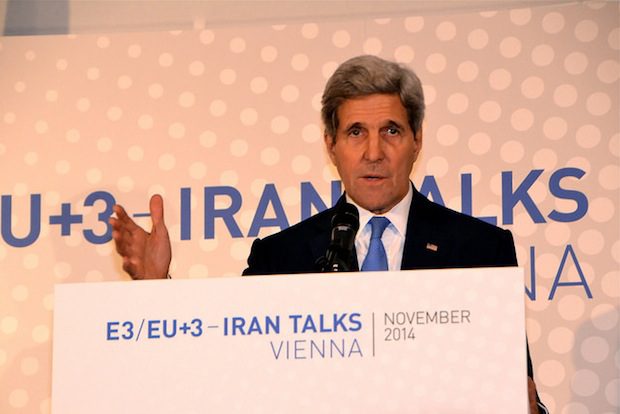A Very Weird Interpretation of U.S. Iran Diplomacy

James Poulos offers a very weird interpretation of the framework agreement with Iran:
This deal indicates the logic behind the administration’s curious habit of putting daylight between the U.S. and its friends around the world. Not since the Suez crisis has a president so sharply distinguished American interests from those of its allies [bold mine-DL].
In this sense, the debate over the framework agreement — and all that might follow — is a debate over two rival visions of American exceptionalism. One side, dominated by Republicans, believes our unique place in the world betokens a moral and strategic imperative to stand with smaller powers outside the orbit of our biggest adversaries. The other side, dominated by Democrats, believes almost the opposite.
Poulos’ interpretation would make much more sense if the framework agreement hadn’t been reached in concert with three of America’s oldest and most important allies, but we all know that it was. The EU 3 (Britain, France, and Germany) are all in favor of an agreement that has supposedly put the U.S. at odds with the interests of its allies. Our main European allies were there participating in the talks alongside our diplomats and officials. So it’s simply wrong to say that this framework agreement reflects a “curious habit of putting daylight between the U.S. and its friends around the world.” To believe this requires completely ignoring the many allies that approve of the progress that has been made in the nuclear talks and paying undue attention to the criticisms of a handful of client governments.
The evidence for the “curious habit” Poulos describes has never been very strong, but that hasn’t stopped many critics from presenting it as incontrovertible fact for the last six years. Then again, if the administration did have a habit of doing this, it wouldn’t really be all that curious. The interests of different states are bound to diverge from time to time, and the responsibility of our government in its conduct of foreign policy is to look after U.S. interests first and foremost. So it shouldn’t be surprising or curious if there is sometimes “daylight” between the U.S. and its allies and clients. What’s striking–and more than a little disturbing–is how rarely this has happened in recent years. I can think of a few high-profile cases (e.g., the Libyan war) when the administration didn’t put any daylight between the U.S. and our allies, and the results were disastrous. Indeed, some of the administration’s worst foreign policy mistakes have come from doing too much to defer to allies and clients’ preferences. We can see them doing it again in Yemen right now.
There are a few regional clients that aren’t pleased with American diplomacy with Iran, and there is one in particular (Israel) that has gone out of its way to oppose that diplomacy in public as loudly as it can, but they are not at all representative of America’s “friends around the world.” These clients are often called allies, but that is exactly what they aren’t. It is very weird to give the objections of these few clients priority over the views of our more important allies, especially when the framework agreement advances towards a goal that is in line with what those regional clients claim to want (i.e., an Iran that lacks the ability to build a nuclear weapon). It is even weirder to go from this odd interpretation of U.S. relations with its allies to making a sweeping statement about “rival visions of American exceptionalism.”
There also doesn’t seem to be much evidence that there is a “vision of American exceptionalism” whose adherents believe “almost the opposite” of standing “with smaller powers outside the orbit of our biggest adversaries.” If I understand correctly what Poulos is implying here (that there are many Americans that believe the U.S. should be standing with adversaries against smaller powers), he is badly mistaken. Americans aren’t facing a choice between the “rival visions” Poulos mentions because the second “vision” has no supporters.
Comments